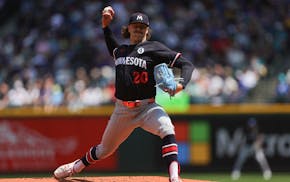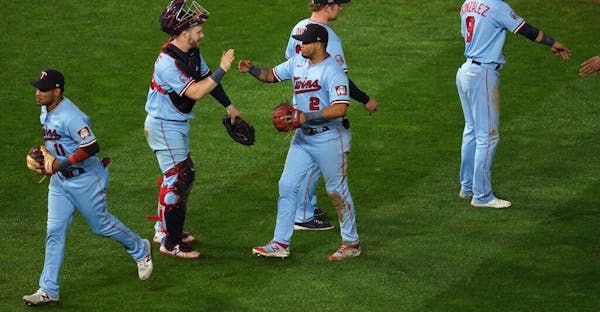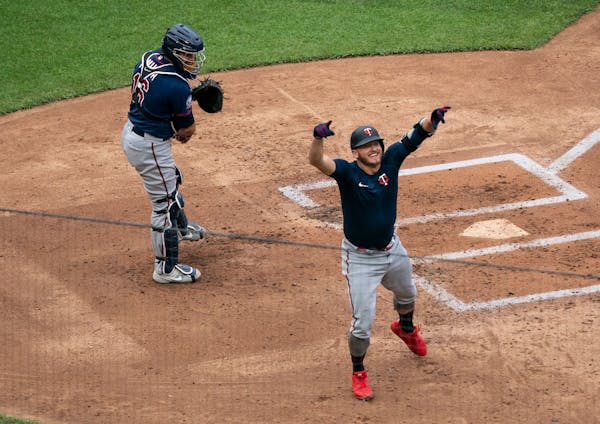It's a singular moment in baseball history, something that had never happened before or since, so Kent Hrbek always feels the same emotion when he considers his role in it: Regret.
"Every time I see it now, I think, 'How come I didn't keep the baseball?' " Hrbek said. "I'm not a big souvenir guy, I'm not a hoarder, but I wish I had that. There aren't too many 'onlys' in baseball."
Thirty years ago Friday, though, the Twins created one in Boston's Fenway Park. In the bottom of the fourth inning of that July 17, 1990 game, Gary Gaetti, Al Newman and Hrbek turned an around-the-horn triple play. And four innings later, they did it again.
Two in one game? They didn't realize the significance until later.
"It's the only — o-n-l-y — time it's ever been done. All the years they've played baseball, it's happened only one time, so it's a really neat record," Hrbek said. "But I didn't know. I ran off the field and just bounced the ball next to the mound. Never thought to keep it."
Maybe that's because the Twins had other concerns at the time. As Newman recalls it, the triple plays weren't the focus in the Twins' dugout or clubhouse.
"The thing I remember most is that we lost that stinking game, 1-0," Newman said. "That may be the most upset I ever saw [manager] Tom Kelly after a game."
Yeah, getting shut out by a Red Sox journeyman lefthander named Tom Bolton and former Twins closer Jeff Reardon could be upsetting, especially since the Twins wasted a strong performance by their rookie Scott Erickson, making just his fifth career start. "For it to happen twice in a game, it's really astounding," Kelly said. "But it didn't mean much afterward. Not to be able to score a run in Fenway, not to hit their kid, that's what I remember."
The meaning began to sink in soon, though. The next morning's Star Tribune invoked Tinker-to-Evers-to-Chance in describing the feat, noting that more than 134,000 major league games had been played at the time, and none included two triple plays. There have been roughly 67,000 more played in the three decades since that day, too, and it hasn't happened again.
"Whenever I see someone has turned a triple play, I pay attention," Hrbek said. "I want to see if someone can tie our record. They'll never beat it."
Yet the most remarkable thing about those triple plays is how simple they were, how seemingly mundane. So much so that Newman says Gaetti actually expected the first one.
It came in the fourth inning, with the bases loaded and former Twin Tom Brunansky due up. "Gaetti made eye contact with me and motioned like, 'Hey, I'm going to step on the bag and come to you,' " Newman said. "I gave him a thumb's-up. And I'll be darned if it didn't happen."
Brunansky smacked a sharp two-hopper to Gaetti, who took two steps to his right and stepped on third base, pivoted and fired the ball to Newman. The second baseman took the throw while avoiding a sliding Carlos Quintana, and completed the triple play with a relay to Hrbek, barely beating Brunansky.
"Triple plays must be a pitcher's very best friend," Erickson said after the game.
Four innings later, Boston put runners on first and second base with Jody Reed at the plate. Newman expected a sacrifice bunt, but instead Reed hit a sharp grounder directly at the bag, which Gaetti stepped on as he fielded the ball. Reed stumbled out of the box, so Newman had plenty of time — too much, he said, and his throw forced Hrbek to stretch to his left, though Reed was out by 10 feet.
"Mercy Me, Gerald!" exclaimed Red Sox broadcaster Ned Martin.
Over the next few days, the uniqueness of the feat began to sink in. Hrbek had his teammates sign the next day's Boston Globe, which is framed and displayed in his basement to this day.
"It's a cool memory, but you don't hear about it much anymore," Hrbek said. "It had to be the Twins, who never get any praise anyway. If the Yankees had done it, they'd have it on TV every day."
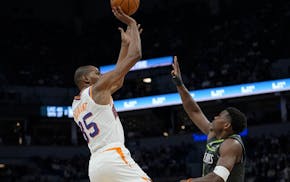
Souhan: Will the Timberwolves trade for Kevin Durant? Should they?
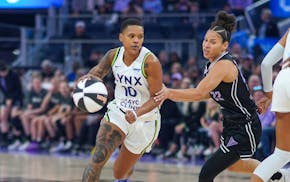
Lynx improve to 7-0 with strong second half vs. expansion Valkyries
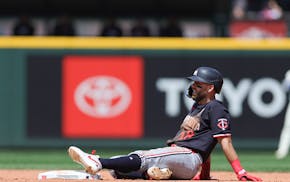
Twins lose in walk-off against Seattle for second straight game
Three-goal outburst in second half helps Minnesota United to rare victory in Seattle
